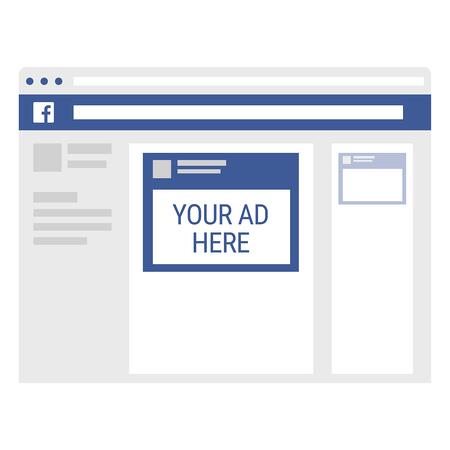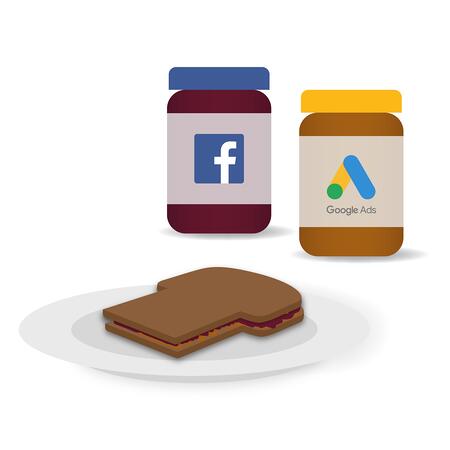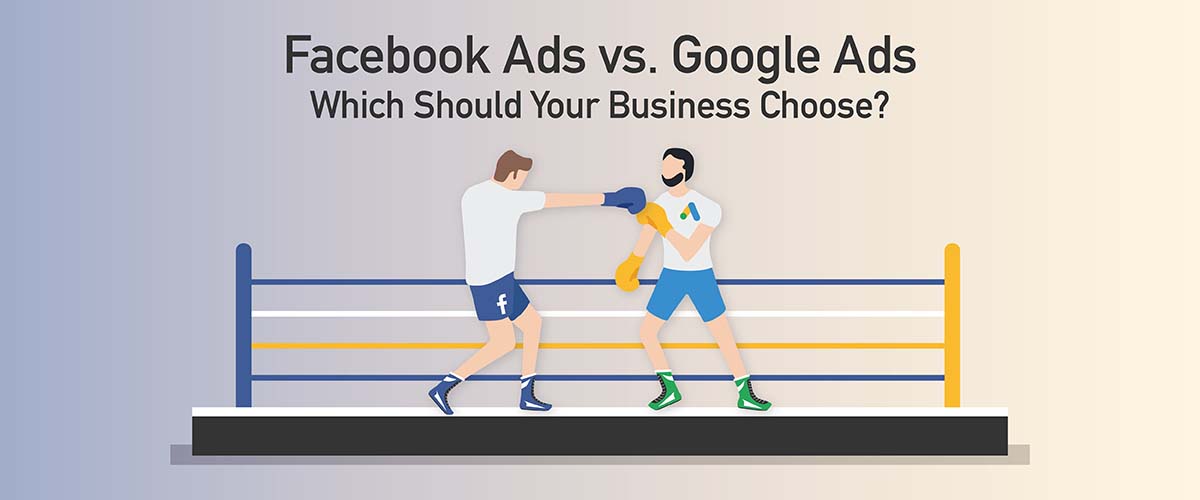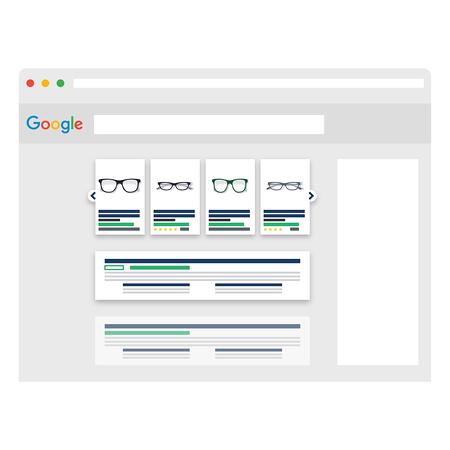Before deciding on which digital marketing platform you should utilize, consider the outcome you hope to gain from your investment. Because believe it or not, Facebook Ads and Google Ads don’t deliver the same results.
Generally speaking, Google Ads do a better job of driving sales while Facebook Ads are an effective way to build brand awareness. If your goal is to sell products or generate leads, Google Ads is a great solution. On the other hand, if your goal is to build brand awareness or remarket to past site visitors, Facebook Ads could prove to be a better investment.
Regardless of which platform you use, considering the differences between each one and how they relate to your business goals will increase the chances of your investment going further. Before you make a decision, let’s dive into what Facebook Ads and Google Ads are and what they can do for your business.

What are Facebook Ads?
Facebook Ads are a great tool for building brand awareness and can provide great results for businesses selling products. Businesses using Facebook Ads to successfully sell products are marketing price-competitive products to a focused target demographic.
Facebook Ads are more inviting than other types of advertisements. They fit in perfectly on Facebook’s news feed and don’t come off as disruptive. Companies producing well-made, inviting content will find that people want to interact with these advertisements and see exceptional results from them.
If you are looking to drive more traffic to your website, Facebook Ads are a great gateway to capture new followers within your target audience to nurture and turn into recurring customers.
What are Google Ads?
Google Ads is built to help your business generate new leads based on a specific search relevant to the business. By targeting specific keywords and keywords phrases, you can capitalize on a person’s potential to make a purchase.
Increasing the bottom line of a business is the overall objective of any Google Ads campaign. So getting the right advertisement in front of a potential customer at the moment where they are most likely to make a purchase, or inquire about services, is the first step in achieving that goal.
Besides text-based advertisements that appear during a Google search, there are other channels in which advertisers can get their message in front of potential clients. Whether you’re focused on increasing brand awareness and site traffic or selling products online, Google Ads is a well-rounded platform for advertisers looking to address a variety of needs under one roof.
What’s the Difference Between Facebook and Google Ads?
On a platform level, Google and Facebook are really quite distinct from each other, so it’s important that you understand what is different between them. The differences in reach and targeting expose both advantages and disadvantages of these two advertising options.
Reach
Google Ads can be shown on two networks, the Search Network and the Display Network. Text-based ads and Google Shopping ads utilize the former while image and video-based ads make use of the latter. The variety of ads that you can run on the Google Ads platform is definitely an advantage, as is its reach. Yielding over 2 trillion searches per year, Google is the largest and most popular search engine.
Whereas Google Ads can show advertisements on Search Engine Results Pages (SERPs) and on any website that has made ad space available for Google’s use through its AdSense program, Facebook Ads appear on Facebook itself and its affiliated platforms, like Facebook messenger and Instagram. Boasting over 2 billion monthly users alone, Facebook’s traffic isn’t a number to scoff at. As the largest and most popular social media platform, there is a lot of potential to reach new customers through Facebook Ads.
Targeting
While you can implement demographic targeting within your Google Ads, it is much easier to reach specific audiences through Facebook Ads. In fact, all Facebook Ads are tailored to target people based on the information that’s included in their accounts. Factors like age, location, and interests play a major factor in who is served which ads.
In Google Ads though, carrying out demographic targeting can be a challenge. For it to work properly, users need to be logged into a Google account to be served ads based on their demographics. Google does try to infer certain identifiers from the information gathered in the form of browser cookies, but this method isn’t always effective.
Tracking Facebook and Google Ads
How ad success is tracked is one commonality the two marketing platforms share. Tracking conversions in your Google Ads can be done by adding a small piece of code to certain pages on your website. Setting up conversion tracking for your Facebook Ads is quite similar. Facebook supports internal tracking through its Facebook Pixel, which is an additional piece of code that you tack onto your website. Furthermore, you can monitor conversions through your site’s Google Analytics.

Using Facebook Ads and Google Ads Together
If your budget allows, using Facebook Ads and Google Ads together can prove to be a lucrative investment. Hitting both paid search and paid social will give your business a comprehensive marketing strategy that will most likely prove itself to be successful. Serving ads to both, people researching on Google and Facebook users scrolling through their feed, allows you to expand your reach and capitalize on two audience groups with different intent.
Focusing on branding through Facebook Ads and the promotion of your products and services through Google Ads is one tactic that could be applied to any business type. Capitalize on the traffic generated by Facebook Ads by creating ways to get them to engage with your site through email list sign-ups, limited time promotions, or promotional video views. Facebook Ads can take some time to result in sales, but just getting people to visit your website is a great first step.
While using Facebook Ads to bolster your brand awareness, run Google Ads to generate more sales. Advertising on Google will allow your business to cash in on people searching to get a specific need met and are more likely to convert when they see a relevant ad as opposed to someone scrolling through Facebook. For example, running Google Shopping Ads for the products you sell on your website is a great way to expose your business to people looking to make a purchase. For your Search Ads, make sure to select a healthy number of relevant keywords and consider how location targeting could better improve your results.
Using both platforms together can give you an outcome you couldn’t have achieved had you only advertised on one.
Making a Decision
Like other financial investments, performance is nearly impossible to guarantee—but with the right information you can minimize risks by making decisions based on your business goals. Depending on your industry type and business goals, it might make sense to just utilize either Google Ads or Facebook Ads. But, for the majority of businesses, investing in both can produce great results.
*This blog was updated on 3/20/2019

Logical Position, an Inc. 500 digital agency supporting 5,000+ clients across North America. LP is the proud recipient of Google’s Lead Generation Premier Partner of the Year and Microsoft's Global Channel Partner of the Year 2024! The award-winning agency offers full-service PPC management, SEO, Paid Social, Amazon and Creative Services for businesses large and small. As a Google Premier Partner, Microsoft Elite Partner & Meta Business Partner, LP is in the top 1% of ad spend managed across platforms.





